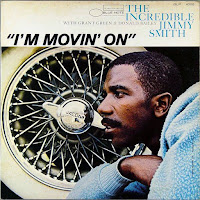Jimmy Smith - I'm Movin' On
Released - September 1967
Recording and Session Information
Van Gelder Studio, Englewood Cliffs, NJ, January 31, 1963
Jimmy Smith, organ; Grant Green, guitar; Donald Bailey, drums.
tk.2 Hotel Happiness
tk.11 Cherry
tk.13 'T Ain't No Use
tk.15 I'm Movin' On
tk.16 Back Talk
tk.20 What Kind Of Fool Am I
Track Listing
| Side One | ||
| Title | Author | Recording Date |
| I'm Movin' On | Hank Snow | January 31 1963 |
| Hotel Happiness | Earl Shuman, Leon Carr | January 31 1963 |
| Cherry | Ray Gilbert, Don Redman | January 31 1963 |
| Side Two | ||
| Tain't No Use | Burton Lane, Herbert Magidson | January 31 1963 |
| Back Talk | Jimmy Smith | January 31 1963 |
| What Kind of Fool Am I? | Leslie Bricusse, Anthony Newley | January 31 1963 |
Liner Notes
FIRST of all, I'm not the kind who goes around predicting stardom for various musicians after hearing them for the first time. It is not that I am afraid of getting egg on my face but rather that I feel in most cases one can't make judgements like that so quickly. If I am not an "I told you so" kind of guy, I am also not going to tell you that I thought he was destined for great heights the first time I heard him but that I didn't mention it at the time. Except in the case of Jimmy Smith!
In 1956 I had occasion to hear a home-recorded tape of Jimmy that didn't do justice to his sound, but showed, with unmistakable clarity, that his was a talent that would not remain hidden for long. I gave strong advice to some people about recording him but they didn't act. Too bad for them. When Alfred Lion of Blue Note heard Jimmy he didn't hesitate and the rest is well known to anyone who has followed the American music scene for the past ten years.
Jimmy Smith is the man who really brought the organ to the fore. Wild Bill Davis, Bill Doggett and Milt Buckner had achieved some recognition and success with the instrument but none had the impact of Jimmy Smith. Jimmy will go down as a great popularizer of the jazz organ. However, if he had never inspired another organ trio into existence he would be important just for his own playing. He has all the ingredients that make for a dynamite performer: the surging swing; the deep soul; the fantastic dexterity; and the ability to inventively utilize the many colors available to an organist. Above all, Jimmy has that "thing" that all the great ones possess. Call it duende, charisma or what you will. It still adds up to a magnetism that grabs you and won't let go.
A number of fine guitarists have appeared and recorded with Jimmy Smith. On Blue Note we have heard Thornel Schwartz, Eddie McFadden, Quentin Warren and Kenny Burrell. Now we have an opportunity to hear him with one of today's great guitar stylists, Grant Green. Although Green has never been a member of the Jimmy Smith trio on any kind of a regular basis, the two go together like beefsteak tomatoes and Bermuda onions. The salad dressing is the drumming Of Donald Bailey, whose combination of smoothness and tang is a perfect oil and vinegar.
Lest we all begin to get too hungry, consider the music made in this album—or if music be the food of love, play on. The set hits right on the title tune, I'm Movin' On by the country & western star Hank Snow. Blues in a knocked-out groove with Bailey tambourining it up and some effective suspensions by Smith lead right into some of that quick-liquid Green swing. Then Jimmy shows how to build a bright fire without taking all the stops out. This trio is movin' on with the wind at its back.
Hotel Happiness sounds like it adjoins a big patch of sagebrush. Jimmy leads with a loping gait as the others mosey along as relaxed as can be. There is a tinge of sadness in the hotel but not enough to really bring anyone down.
Don Redman's evergreen Cherry flows smoothly on the deft brush strokes of Donald Bailey. Jimmy's subtle, understated rendering of the theme leads into some fine improvisation for right hand before he takes the number out.
T'ain't No Use, the kind of tune they used to call a "blues ballad", closes side one in the generally low-keyed mood set in the previous tracks. Grant is back in the solo spotlight here and both he and Jimmy do some "crying" before they're finished.
A medium-tempo blues by Smith, entitled Back Talk/ opens side two. Jimmy makes the first statement and Grant heats things up further as a prelude to a series of choruses traded between the two. They never get down to eights or fours but continue to each bite off twelve bar chunks. This may be back talk but it sounds more like complete communication.
The finale is Jimmy stopping the world with a highly romantic reading of What Kind Of Fool Am I. This is music to lie on a double-thick, double-size mattress by, and while away the cares of the day. It could be the last recording your own personal radio station plays before leaving the air. It has that kind of feeling and is another example of how many different moods Jimmy Smith can evoke.
At this point, I was going to quote Andrew Carnegie on organs from something I ran I realized we didn't need across in the New York Times. When it came down to it, Andrew Carnegie, or even Dale Carnegie for that matter. When it comes to organs, Jimmy Smith says it all.
—IRA GITLER
(author of "Jazz Masters of the 40's", MacMillan)



No comments:
Post a Comment